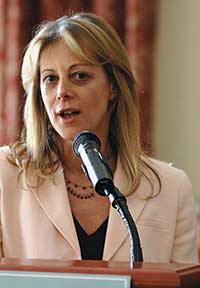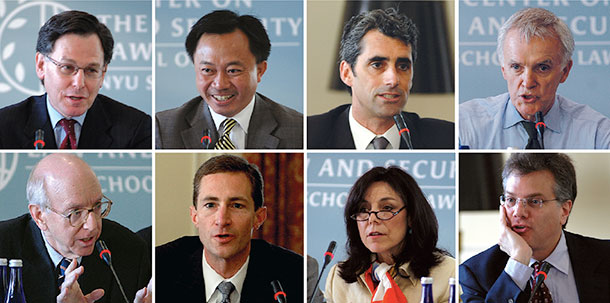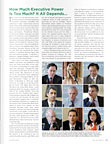How Much Executive Power Is Too Much? It All Depends…
Printer Friendly Version The Center on Law and Security at the NYU School of Law convened top lawyers, academics, historians, journalists and politicians to argue critical topics concerning the defined roles of the three branches of American government, and how they interact during times of war and peace. The daylong conversation, “Presidential Powers: An American Debate,” took place last April prior to the Supreme Court’s Hamdan decision vacating controversial policies regarding military tribunals, defining enemy combatants and stressing the relevancy of the Geneva Conventions. “John Dean asked me what we hope to accomplish today,” Karen Greenberg, executive director of the center (at right), said when she introduced the former counsel to President Richard Nixon, and the event’s keynote speaker. “I told him, ‘a sustained, engaged dialogue; there’s much too little of it in the United States.’”
The Center on Law and Security at the NYU School of Law convened top lawyers, academics, historians, journalists and politicians to argue critical topics concerning the defined roles of the three branches of American government, and how they interact during times of war and peace. The daylong conversation, “Presidential Powers: An American Debate,” took place last April prior to the Supreme Court’s Hamdan decision vacating controversial policies regarding military tribunals, defining enemy combatants and stressing the relevancy of the Geneva Conventions. “John Dean asked me what we hope to accomplish today,” Karen Greenberg, executive director of the center (at right), said when she introduced the former counsel to President Richard Nixon, and the event’s keynote speaker. “I told him, ‘a sustained, engaged dialogue; there’s much too little of it in the United States.’”
Dean, whose new book, Conservatives Without Conscience, was published in July 2006, and whose bona fides on the topic of executive overreaching are impeccable, said, “After Watergate, I thought the imperial presidency had made its way into the history books.” His experiences as counsel for the besmirched Nixon administration provided a sobering backdrop for the day’s discussions. “Today,” he said, “the lesson of Watergate is, ‘Don’t get caught, and if you do, tough it out and say you’ve got the power.’” He talked about the bad old days in the Nixon White House—recalling being ordered to arrange a punitive tax audit for the Scanlon Monthly, which had accused then-Vice President Spiro Agnew of attempting to repeal the Bill of Rights and to cancel the 1972 elections. He also cited Jack Caulfield’s quashed plot to firebomb the Brookings Institution in retaliation for its criticism of the Vietnam War. While these abuses of power were extreme, he then described Executive Order 13233, which annulled a 1978 law that turns presidential records over to the public 12 years after an executive’s departure. President Bush signed the order within his first year of office—just weeks after 9/11. The level of secrecy of this administration, Dean warned, has “reached a startling stage.”
The rest of the day was devoted to mostly polite but sometimes heated conversations moderated by the faculty codirectors of the center, Professors Noah Feldman, David Golove, Stephen Holmes and Richard Pildes. The framers of the constitution had not predicted political parties, said Pildes, and the idea of checks and balances presumes Congress’s desire to fully participate in governing as well as oversight. Sidney Blumenthal, former adviser to President Clinton, agreed that partisan abuse is “political in character, fundamentally.” But Judge Richard Posner of the U.S. Court of Appeals for the Seventh Circuit, and Viet Dinh, a former U.S. assistant attorney general for legal policy from 2001 to 2003, disagreed. “Congress is inadequate to deal with security and dispatch in matters of national security,” said Dinh. Laws passed by Congress “encourage the President to claim and exercise inherent powers,” insisted Posner, particularly in light of new threats to the U.S.
Former Nebraska senator, and now president of the New School, Bob Kerrey offered harsher criticism of Congress. The War Powers Resolution, Kerrey said, did not provide carte blanche to any president to challenge an abstract terrorist threat. Congress was explicitly to blame, concurred Michael Vatis, a lawyer at Steptoe & Johnson in Washington, D.C., for allowing the executive branch to waylay civil liberties by authorizing clandestine wiretaps on U.S. citizens and indefinitely detaining enemy combatants. If the president is allowed to take power, Vatis said, then he’ll take it. Patrick Philbin, former associate deputy attorney general at the Department of Justice, countered that the war on terror “is a very different war, but a war nonetheless” and the President must be allowed to act.
Donna Newman, the New York City criminal defense attorney assigned in 2002 to represent Jose Padilla, a U.S. citizen deemed an enemy combatant, said that she was dumbfounded by the disregard for due process where her client was concerned. The President has constructed an “atmosphere of fear” as a basis for grabbing power. “It’s a fear of liberty, not terrorism,” she said, “to somehow say that freedom is what makes us vulnerable.”

